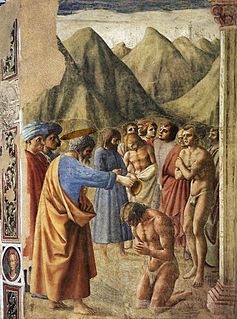
Baptism is a form of ritual purification -- a characteristic of many religions throughout time and geography. In Christianity, it is a Christian sacrament of admission and adoption, almost invariably with the use of water. It may be performed by sprinkling or pouring water on the head, or by immersing in water either partially or completely, traditionally three times, once for each person of the Trinity. The synoptic gospels recount that John the Baptist baptised Jesus. Baptism is considered a sacrament in most churches, and as an ordinance in others. Baptism according to the Trinitarian formula, which is done in most mainstream Christian denominations, is seen as being a basis for Christian ecumenism, the concept of unity amongst Christians. Baptism is also called christening, although some reserve the word "christening" for the baptism of infants. In certain Christian denominations, such as the Lutheran Churches, baptism is the door to church membership, with candidates taking baptismal vows. It has also given its name to the Baptist churches and denominations.

The King James Version (KJV), also the King James Bible (KJB) and the Authorized Version, is an English translation of the Christian Bible for the Church of England, which was commissioned in 1604 and published in 1611, by sponsorship of King James VI and I. The 80 books of the King James Version include 39 books of the Old Testament, an intertestamental section containing 14 books of what Protestants consider the Apocrypha, and the 27 books of the New Testament. Noted for its "majesty of style", the King James Version has been described as one of the most important books in English culture and a driving force in the shaping of the English-speaking world.

The Lord's Prayer, also called the Our Father or Pater Noster, is a central Christian prayer which, according to the New Testament, Jesus taught as the way to pray:
"Pray then in this way ..."
"When you pray, say ..."

The New Testament (NT) is the second division of the Christian biblical canon. It discusses the teachings and person of Jesus, as well as events in first-century Christianity. The New Testament's background, the first division of the Christian Bible, is called the Old Testament, which is based primarily upon the Hebrew Bible; together they are regarded as sacred scripture by Christians.

William Tyndale was an English biblical scholar and linguist who became a leading figure in the Protestant Reformation in the years leading up to his execution. He is well known as a translator of the Bible into English, and was influenced by the works of prominent Protestant Reformers such as Martin Luther.
In Christianity, agape is "the highest form of love, charity" and "the love of God for man and of man for God". This is in contrast to philia, brotherly love, or philautia, self-love, as it embraces a deep and profound sacrificial love that transcends and persists regardless of circumstance. According to 1 Timothy it comes "out of a pure heart, and of a good conscience, and of faith unfeigned". It goes beyond just the emotions to the extent of seeking the best for others. The verb form goes as far back as Homer, translated literally as affection, as in "greet with affection" and "show affection for the dead". Other ancient authors have used forms of the word to denote love of a spouse or family, or affection for a particular activity, in contrast to eros.
Church of God is a name used by numerous denominational bodies. The largest denomination with this name is the Church of God

A pastor is the leader of a Christian congregation who also gives advice and counsel to people from the community or congregation. In Lutheranism, Catholicism, Eastern Orthodoxy, Oriental Orthodoxy and Anglicanism, pastors are always ordained. In Methodism, pastors may be either licensed or ordained.

Nontrinitarianism is a form of Christianity that rejects the mainstream Christian doctrine of the Trinity—the belief that God is three distinct hypostases or persons who are coeternal, coequal, and indivisibly united in one being, or essence. Certain religious groups that emerged during the Protestant Reformation have historically been known as antitrinitarian.

Biblical inerrancy is the belief that the Bible "is without error or fault in all its teaching"; or, at least, that "Scripture in the original manuscripts does not affirm anything that is contrary to fact". Some equate inerrancy with biblical infallibility; others do not.
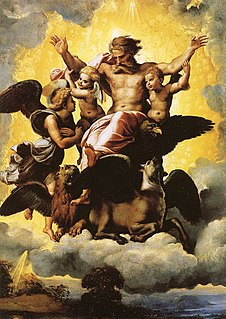
God the Father is a title given to God in various religions, most prominently in Christianity. In mainstream trinitarian Christianity, God the Father is regarded as the first person of the Trinity, followed by the second person, God the Son Jesus Christ, and the third person, God the Holy Spirit. Since the second century, Christian creeds included affirmation of belief in "God the Father (Almighty)", primarily in his capacity as "Father and creator of the universe".

The New Covenant is a biblical interpretation which was originally derived from a phrase which is contained in the Book of Jeremiah, in the Hebrew Bible.
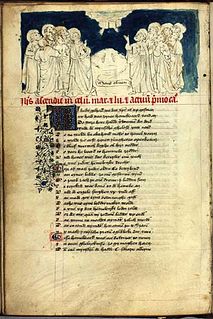
Typology in Christian theology and biblical exegesis is a doctrine or theory concerning the relationship of the Old Testament to the New Testament. Events, persons, or statements in the Old Testament are seen as types prefiguring or superseded by antitypes, events or aspects of Christ or his revelation described in the New Testament. For example, Jonah may be seen as the type of Christ in that he emerged from the fish's belly and thus appeared to rise from death.

The biblical apocrypha denotes the collection of apocryphal ancient books thought to have been written some time between 200 BC and AD 400. Some Christian churches include some or all of the same texts within the body of their version of the Old Testament, terming them deuterocanonical books. Traditional 80-book Protestant Bibles include fourteen books in an intertestamental section between the Old Testament and New Testament called the Apocrypha, deeming these useful for instruction, but non-canonical.
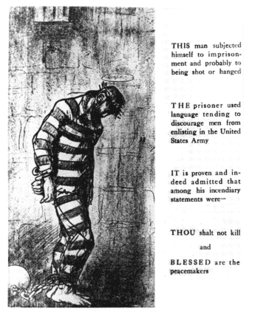
Christian pacifism is the theological and ethical position according to which pacifism and non-violence have both a scriptural and rational basis for Christians, and affirms that any form of violence is incompatible with the Christian faith. Christian pacifists state that Jesus himself was a pacifist who taught and practiced pacifism and that his followers must do likewise. Notable Christian pacifists include Martin Luther King Jr., Leo Tolstoy, Adin Ballou and Ammon Hennacy. Ballou and Hennacy believed that adherence to Christianity required not just pacifism but, because governments inevitably threatened or used force to resolve conflicts, anarchism. However, most Christian pacifists, including the peace churches, Christian Peacemaker Teams, and individuals such as John Howard Yoder, make no claim to be anarchists.

The Tyndale Bible generally refers to the body of biblical translations by William Tyndale into Early Modern English, made c. 1522–1536. Tyndale's Bible is credited with being the first Bible translation in the English language to work directly from Hebrew and Greek texts, although it relied heavily upon the Latin Vulgate. Furthermore, it was the first English biblical translation that was mass-produced as a result of new advances in the art of printing.

The roles of women in Christianity have varied since its founding. Women have played important roles in Christianity especially in marriage and in formal ministry positions within certain Christian denominations, and parachurch organizations.
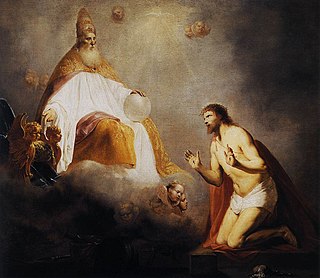
God in Christianity is believed to be the eternal, supreme being who created and preserves all things. Christians believe in a monotheistic conception of God, which is both transcendent and immanent. Christian teachings on the transcendence, immanence, and involvement of God in the world and his love for humanity exclude the belief that God is of the same substance as the created universe but accept that God's divine nature was hypostatically united to human nature in the person of Jesus Christ, in a unique event known as "the Incarnation".

Christian prayer is an important activity in Christianity, and there are several different forms used for this practice.

The Bible usually uses the name of God in the singular, generally using the terms in a very general sense rather than referring to any special designation of God. However, general references to the name of God may branch to other special forms which express his multifaceted attributes. Scripture presents many references to the names for God, but the key names in the Old Testament are El Elyon, El Shaddai and YHWH. In the New Testament Theos, Kyrios and Patēr are the essential names.














